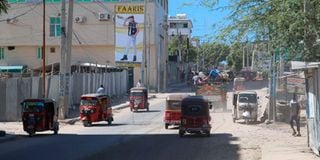Violence displaces 250,000 in 2 weeks in greater Mogadishu: UN

Civilians begin to migrate to safer areas with their belongings after disagreement over the elections between the opposition and the government turned into conflict in Mogadishu, Somalia, on April 27, 2021.
Mogadishu,
More than 250,000 people have been displaced in the past two weeks in violence and generalized insecurity in the Somali capital, Mogadishu, and its environs, the United Nations humanitarian agency has said.
The displacement took place in Banadir, Berdale and Badweyn, including nearly 200,000 in Mogadishu, in Banadir region, the UN Office for the Coordination of Humanitarian Affairs (OCHA) said.
"The violence has also created uncertainty and disrupted delivery of humanitarian assistance. Access remains a challenge to humanitarian operations in Mogadishu with several districts inaccessible," OCHA said in its latest displacement update released on Thursday evening.
An estimated 14,000 internally displaced persons (IDPs) that have settled in 26 sites in Garasbaly and Kahda districts have not yet received assistance, the UN agency said, adding that the IDPs are in acute need of food, shelter, non-food items, protection and health assistance.
It said humanitarian partners have scaled up responses to meet immediate needs in Berdale and Badweyn.
Humanitarian flights to Berdale, which were were suspended a year ago, have resumed, delivering much-needed shelter and non-food items for IDPs.
Many Somalis were seen fleeing their homes in Mogadishu following an outbreak of violence on April 25 between government and pro-opposition forces over the extension of terms of both executive and legislature arms of government by two years.
However, there has been relative calm since President Mohamed Farmajo dropped the plan and agreed to hold elections under an electoral model agreed on Sept. 17, 2020.


